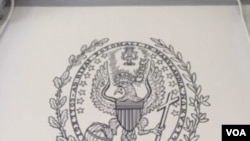“The most appropriate ways for us to redress the participation of our predecessors in the institution of slavery,” said University President John J. DeGioia in a letter to members of the Georgetown community, "is to address the manifestations of the legacy of slavery in our time.”
The university sold their slaves to plantations in Louisiana to pay debts. It raised $115,000, equal to about $3.3 million dollars today, reported The Hoya, the oldest and largest student newspaper of Georgetown University.
Slave descendants will receive benefits
Descendants of these slaves, DeGioia said, will be given “the same consideration we give members of the Georgetown community in the admissions process.” This means that these students will be treated similarly to students who have parents or grandparents who attended the university.
To help locate and reach out to the descendants of these slaves, the Working Group on Slavery, Memory, and Reconciliation launched The Georgetown Slavery Archive, which details the history of slavery at the university. There are also documents listing the names, ages and relationships of the 272 slaves sold in 1838.
The university said it plans on placing a memorial on campus, and to “actively pursue research and teaching, establishing a new Institute for the Study of Slavery and Its Legacies at Georgetown.”
Karima Nodine, a freshman Spanish major at Georgetown, said she had mixed feelings.
“Right now I feel conflicted, because on one hand, I appreciate the fact that they are trying to take responsibility for what happened here because I think it’s a necessary step," Nodine said. "But on the other hand, part of me feels as if they are making too big of a deal about it, as if they are congratulating themselves on doing the right thing here.”
Skepticism about benefits for descendants
Many feel as though this is not enough, and that these students should be granted some sort of monetary award. On Facebook, Max Ramsey posted, “No scholarship, then what's the point? The descendants can't afford tuition there. ... The descendants should be afforded the privileges of the families of tenured faculty.”However, Betel Teka, an international health major at Georgetown, said the university should not provide scholarships or aid to the descendants.
“If you actually need it [aid], then absolutely it is provided for you. I don’t think that they would have to implement another program or an extra thing to satisfy them."
Campus activism paved the way
One of the immediate fixes toward Georgetown’s participation in the slave trade is renaming two buildings on campus. Mulledy Hall, temporarily named Freedom Hall, will be renamed Isaac Hall, after a African-American man who’d been a part of the sale. McSherry Hall will be renamed Anne Marie Becraft Hall, honoring an African-American women who founded an all-girls school in the Georgetown neighborhood.
Renaming the halls was a source of contention last year in the late-fall bloom of student activism on American campuses.
Georgetown students staged a sit-in outside of the president's office last October over the name of Mulledy Hall, according to Slate.
The next day, DeGioia put out a press release stating that both Mulledy Hall and McSherry Hall would be renamed in the future. Now that promise has been fulfilled.
Student activists got some love on Twitter for their work.
Caroline Lagumina, 17, a freshman at Georgetown, said she doesn’t understand the renaming of the halls. While not opposed to what Georgetown is doing, Lagumina said, “It’s very much in the past. A lot of people in the past, like Thomas Jefferson, had slaves. And you know, University of Virginia, UVA, they’re not going to close that whole school.”
About Georgetown, and looking ahead
Georgetown is a private Catholic Jesuit University with an acceptance rate of 16.4 percent as of 2016. According to Georgetown’s website, undergraduate tuition for FY 2017 is $49,968 and graduate tuition is $46,272.
In terms of diversity, Collegefactual.com reports that more than half of the student body is white (56 percent). The remaining students are either international/non-US residents (13.7 percent), Asian (9.2 percent), Black (6 percent) or Hispanic (7.5 percent).
By giving descendants of slaves the opportunity to attend Georgetown, this may raise the percentage of black students.
Teka said she is proud of her school for taking responsibility for its past.
“Finally being able to admit it and owning up to it and being able to say, ‘OK, this was our history, but we’re going to try and do something about that,' " she said, might "relieve some of the aches that we have as a society.”
However, this relies on Georgetown’s ability and commitment to reaching out to the descendants and offering them the benefits, DeGioia said.
This story was written by VOA Interns Rebecca Hankins, Arnella Sandy, Brittney Welch.
Please leave a comment and visit us on our Facebook page, thanks!
[gallery ids="11112,11111,11110,11109,11106"]



